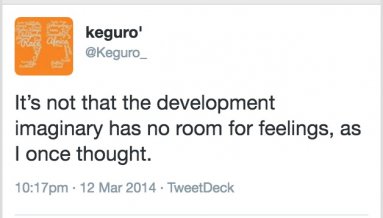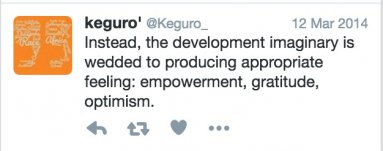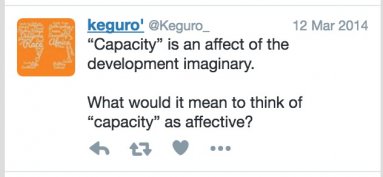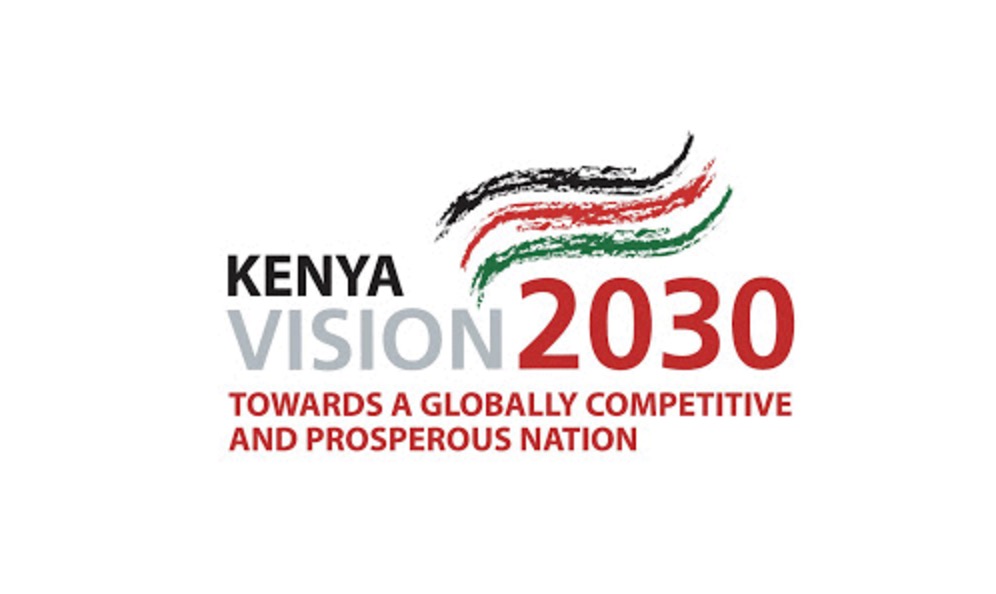something like an introduction:
This record is incomplete. It is missing deleted emails that shaped these ideas; the bibliography of documents--academic articles, development plans (especially Vision 2030), state policies and laws, newspaper articles, art for development projects, and the many people I subtweeted--that subtend this thinking. Let me supply a few guiding notes.
Kenya enters independence alongside and through the development imaginary. I quote myself:
On October 3, 1963, Kenya’s then Minister of Justice, Tom Mboya, delivered a speech, “The Future of Kenya.” Anticipating independence, Mboya argued, “We are quite convinced that if independence is going to mean anything, it must bring with it tangible, material improvement for all our people. It must bring with it the removal gradually, and we hope speedily, of poverty and the improvement in the health and educational services throughout the country.” Mboya’s focus on “independence” as marked by “tangible material improvement for all our people” would later be re-articulated in the 1965 Sessional Paper No. 10, “African Socialism and its Application to Planning in Kenya.” In his opening statement to the Sessional Paper, president Jomo Kenyatta addressed the nation:
To the nation, I have but one message. When all is said and done we must settle down to the task of building the Kenyan nation. To do this we need political stability and an atmosphere of confidence and faith at home. We cannot establish these if we continue with debates on theories and doubts about the aims of our society.
The aim of “building the Kenyan nation” was given priority, a “building” that would be measured through “tangible material improvement for all our people.” This “building,” and, indeed, Kenya’s tangible progress, implicitly depended on silencing debate on the idea and goals of Kenya.
At independence, the development imaginary took silencing political critique as one of its foundations.
Development became a powerful political vernacular.
*
Because development is such a powerful political vernacular, I needed a way to speak through it. Popular histories and theories of neoliberalism (Stuart Hall, David Harvey, Wendy Brown, because I am hopelessly anglophone) root neoliberalism in particular versions of the U.K. and the U.S.--the destruction of the welfare state, privatization of public goods and services, the commodification of subjectivity. (I know there's an alternate genealogy of neoliberalism routed through the global south, but I don't know it.) I was reading these thinkers and trying to find a way to translate what they were saying within Kenyan histories.
*
I remain unconvinced that corruption is Kenya's biggest problem. In fact, I think corruption needs development. Development provides the resources that corruption steals. If Kenya is to fight corruption, it needs a robust theory and practice of economic justice. The development imaginary, as an idea, tries to think beyond anti-corruption as a political strategy and development as the remedy to corruption.
*
I learned how to think about the imaginary from Louis Althusser and Jacques Lacan. I learned how to think about fantasy from Jacqueline Rose and Tim Dean and Joan W. Scott and Amos Tutuola.
*
I place, here, a track of thinking, hoping it might do something.
5 September 2011
email: I've been working on something about the development imaginary--to return to Kenya for a moment--well, started working on many months ago, semi-ditched it, but might return to it. Because the fissure between "the left" and "the mainstream" is such an important part of Kenya's story.
many months ago I said that Kenya is now owned by lawyers--I should have said legal system. And everything I am (now) learning about the hierarchies of the legal system, in which judges think of themselves as sages and gods, confirms what I worried about. And the development imaginary is all about those who know better--about how to mobilize resources, about how to acquire resources, about how to schmooze, and so on--disseminating their knowing better.
18 November 2011
email: I continue to be interested in the violence of the development imaginary--something I've thought about on and off for a long time. And this would include the class stratification intensified by the proliferation of NGO and CS positions which *need* class inequity to continue their work. And so work, in various ways, to sustain it. It's very strange and very violent.
undated
notes toward a blog post:
We are interested in how the Development Imaginary interacts with and conditions possibilities for political action. Below, we outline key features of this imaginary.
- The transformation of activism (from “grassroot” to ?) into a professional activity (activists as a professional class?)
- Competition for donor resources
- Project-driven goals
- Expectations driven by economic rationales (so, whether projects become “self-sustaining” or “economically profitable) as opposed to political goals
- Creation of dense networks—I’m thinking of the idea of Civil Society as a dense lattice-work framework that is actually distinct from civil society
16 December 2012
email: Is it because of the development imaginary? We all started talking structural adjustment and from there went down the neoliberal rabbit hole where we met German God and got saved?
30 July 2013
email: A few years ago, I wanted to write something about the development imaginary, the psychic-ideological-material thing that surrounded, suffused, and enabled development discourse. At the time, I thought it was about NGOs and the kind of report imaginary they have produced, so powerful as to be the only way we now think and dream. Today, I would re-write that thing that was not written to discuss development as a relationship to killability and disposability. About houses destroyed, families moved, ways of life disciplined and disregarded.
I would write about how development has become a term that creates compliance and complicity, a law-invoking term, a disciplinary term. For who, in fact, can be "against development"? To stake such a claim is to expose oneself to ridicule. But I think we must tether the development imaginary to disposability and killability; we must begin to map more forcefully what it destroys and makes impossible; we must begin to push back against its seemingly inexorable logic.
11 February 2014
email: That right there is the development imaginary: no one outside of my numbers.
(dates on tweets)



Twitter (as text)
17 November 2014: Eight: the co-opting of imaginations into the development imaginary, a parasitic imaginary that kills imaginative possibilities
18 November 2014: Instead, we accept dangerous definitions of power, we laud killing practices, we inhabit the development imaginary
21 November 2014:
(I’d love to write more about the development imaginary, but the pain of wading through state documents stops me)
I really am convinced that the development imaginary is anti-freedom and anti-imagination.
The development imaginary privileges policy-making over life-changing. As long as it’s documented in some way, it’s all good.
“Gains” happen as lives change, and as that change is measured in increased livability. The development imaginary cannot see this.
6 December 2014:
the development imaginary
such fast-spreading poison
I need to read more Stuart Hall
13 January 2014:
development imaginary strikes again and again
it really is the mosquito that won’t die
22 December 2014: Can someone please poison the development imaginary until it’s dead, dead, dead, and then dead some more?
26 March 2015: (Continuing my ongoing thinking on [really, against] the development imaginary)
22 May 2015: (that development imaginary is strangling you—and you think it’s all erotic asphyxiation until you die)
30 May 2015:
perhaps, to the development imaginary, I would now add the institutional imaginary and, in particular, the legal pit latrine
the development imaginary and the institutional imaginary are interested, above all, in reproducing themselves, in their survival
17 July 2015: "Development Imaginary Praised for Killing Freedom Dreams," and other Kenyan headlines
13 August 2015: More precisely, to tell the story of the Kenyan state, we cannot remain trapped within its development imaginary.
24 September 2015: Well, 50 years after independence, Kenya is on the development train, deeply embedded in the development imaginary.
28 September 2015:
I use "development imaginary" a lot. A few rough notes on how and why I use it. They will not be numbered. They will stray here and there.
The development imaginary sells itself as a shared, collective vision. We all want development, we are told.
So convincing has the development imaginary been, that all other aspects of living together, all ethical frames, are subordinated to it.
The development imaginary is unethical and anti-intellectual.
The development imaginary has been especially hostile to our imaginations and our freedom dreams.
Perhaps what frightens me the most is the effect the development imaginary has had on our freedom dreams.
The development imaginary has hobbled our thinking. It continues to limit our dreams. It cannot teach us how to live together.
9 October 2015: Thanks for praising the unhuman development imaginary, and patting yourselves on the back for excellence in mediocrity.
13 October 2015: the development imaginary is strong within us, and it smashes freedom dreams
6 April 2017: I'm wondering how that plays with the development imaginary--because that imaginary--and the neoliberal projects it supports--needs "tribe"
